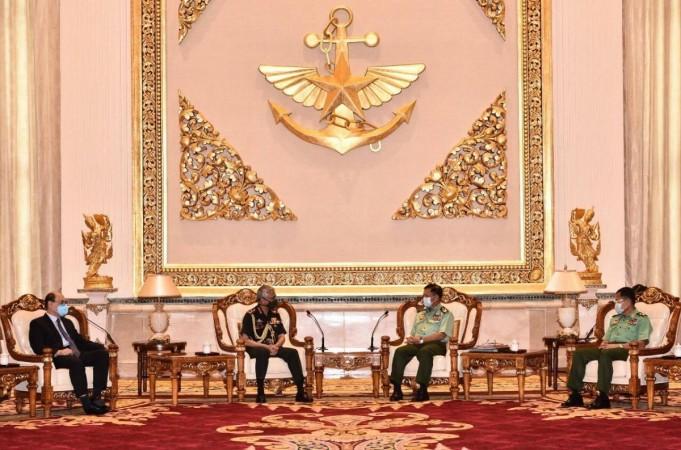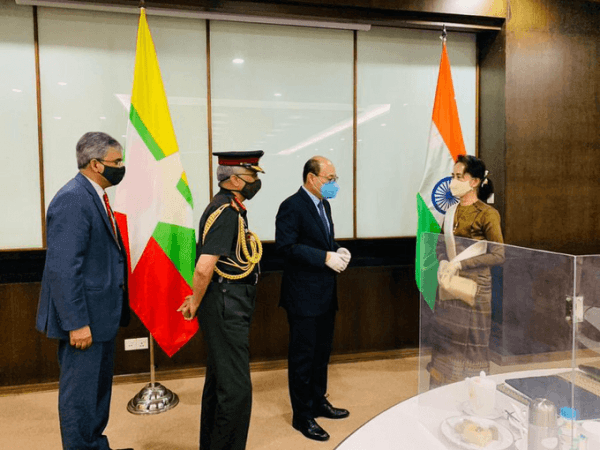In its persistence efforts to counter Chinese influence, India on Thursday announced to deliver a submarine to Myanmar Army as part of defence cooperation between the country south Asian countries.
"India will be delivering a Kilo Class submarine INS Sindhuvir to Myanmar Navy. This will be the first submarine of Myanmar Navy," Anurag Srivastava, Spokesperson of Ministry of External Affairs (MEA) said during a virtual briefing.
INS Sindhuvir was refurbished by Hindustan Shipyard Limited in Visakhapatnam. India and Myanmar have agreed to train personnel for the new submarine fleet at the submarine training base at the south Indian port city.
However, it is unclear if this represents a lease or a permanent transfer. The Russian-built attack submarine was inducted into the Indian Navy in the late 1980s.

The move is being seen as part of India's efforts to counter the growing military and economic influence of China in the region, which is a cause of worry for India.
India and China are locked in a bitter stand-off along the Line of Actual Control (LAC), the de-facto border. In July this year, 20 Indian soldiers were killed in a clash between two armies in Galwan valley. However, the number of Chinese losses were unconfirmed as China didn't recognise their martyrs.
Act East Policy
The announcement came days after the visit of Indian Army Chief General Manoj Mukund Naravane and Foreign Secretary Harsh Vardhan Shringla to Myanmar. During the visit, Naravane and Shringla had met with Commander-in-Chief of Myanmar Defense Forces General Min Aung Hlaing and discussed "issues of bilateral importance".
During the visit, India had agreed to supply 105 mm artillery guns, a large quantity of ammunition for Tin tanks, radars and sonars for ships of the fledgeling Myanmar Navy and 500 bullet-proof jackets (BPJs), StratNews Global reported.
The report says that General Naravane had presented two bullet-proof jackets to his Myanmar counterpart during their meeting in Nay Pyi Taw, the country's capital.
In a statement, the government had said, "India attaches high priority to its relationship with Myanmar in accordance with its 'Neighborhood First' and 'Act East' policies. In recent times, both sides have strengthened their cooperation in several areas, including connectivity and trade, development projects, energy, capacity building, defence; and security and culture, and people to people links."
Cementing ties with neighbours
Apart from the "broad-basing" defense relationship, India has been assisting Myanmar in many fields including infrastructure, power and energy. "India and Myanmar agreed to strengthen their partnership in connectivity projects, capacity building, power and energy, deepen economic and trade ties, further facilitate people to people and cultural exchanges, and broad-base their defence exchanges across all the three services," the government said after the high profile visit earlier this month.
Like many other countries around the world, India has supported Myanmar in its fight against coronavirus pandemic, a highly contagious disease originated in China. India gave 3000 vials of Remdesivir to Myanmar State Counsellor Aung San Suu Kyi in a symbolic move its commitment to assist Myanmar in its fight against the pandemic.
Foreign Secretary Shringla had indicated India's "willingness to prioritize Myanmar in sharing vaccines as & when these become available".

Myanmar's importance in Indian diplomacy
India's decision to deliver a submarine to Myanmar particularly at a time when it faces two enemies and has a shortage of undersea platforms underlines its willingness and necessity to prevent China from gaining a foothold in Indian Ocean Region.
Cementing military ties with Myanmar is also important for New Delhi, given the fact that Myanmar's Army dominates the policies and decision making.
In 2017, India delivered the first batch of Advanced Light Torpedo to Yangon. During General Naravane and Shringla's visit, Myanmar also promised to step up security to the Kaladan multi-mode transport project that will connect India's north-east with Myanmar. Myanmar-based insurgent groups have been targeting the project, threatening construction workers and preventing its progress.















